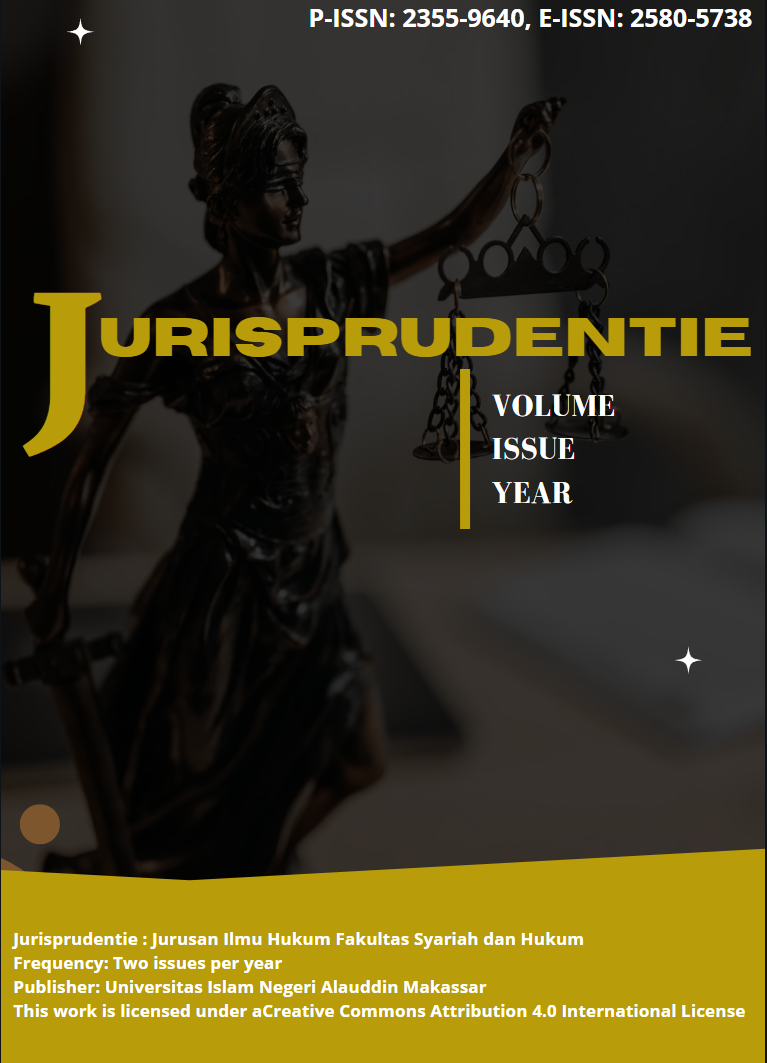PARALEGALS AND HUMANITARIAN RESPONSIBILITIES IN ADVOCATING SURVIVORS OF THE MOST SERIOUS CRIMES: LEARNING FROM WOMEN VOLUNTEERS FOR HUMANITY IN NORTH ACEH DISTRICT
Abstract
The most serious crimes that occurred in North Aceh left a deep scar for the victims. The birth of impunity causes victims to be naturally forced to survive. However, various fundamental rights that are difficult to access are a significant problem for survivors due to post-conflict trauma, making it difficult for survivors to open up to the local government. Therefore, the Women Volunteer Advocacy Institute for Humanity (RPuK) is here to bridge the fundamental rights needs of survivors with advocacy to local governments. This study aimed to determine the existence of RPuK in accommodating the fundamental rights of survivors. The method used is empirical legal research with interview and observation techniques. The study results reveal that the existence of RPuK for ten years in North Aceh Regency has built a unique advocacy program with the Regional Government in terms of fulfilling integrated service programs and unique service bazaars for survivors of the most serious crimes. Both programs focus on making identity cards, health insurance cards, marriage certificates, service mental health, employment assistance, and other fundamental rights. This success is a form of reparations as part of the fulfillment of transitional justice to the survivors. Interestingly, RPuK made a breakthrough in its food security advocacy program for the survivors during the pandemic. Thus, RPuK sees a new perspective that is far more important, prioritizing the survivors during the pandemic, fulfilling the survivors' economic, social, and cultural rights to fulfill human rights and transitional justice.
References
Daeli, Sorni Paskah. “Eksistensi Lembaga Swadaya Masyarakat Di Kalimantan Barat.” Jurnal Bina Praja 4, no. 1 (2012): 57–66.
Daudy, Muhammad Heikal. “Jalan Panjang Menuju Rekonsiliasi.” Kanun: Jurnal Ilmu Hukum 18, no. 3 (2016): 377–383.
Fadhil, Moh. “Impunitas Dan Penerapan Keadilan Transisi: Suatu Dilema Penyelesaian Kasus Pelanggaran HAM Berat Di Masa Lalu.” Petitum 8, no. 2 (2020): 100–113.
Fajar, Mukti, and Yulianto Achmad. Dualisme Penelitian Hukum Empiris & Normatif. Yogyakarta: Pustaka Pelajar, 2010.
Hasni, Khairul. “Post Conflict Kekerasan Terhadap Perempuan Dan Perdamaian Aceh.” Lentera: Jurnal Ilmiah Sains dan Teknologi 14, no. 9 (2014): 24–29.
Intan, Salmah. “Kedudukan Perempuan Dalam Domestik Dan Publik Perspektif Jender (Suatu Analisis Berdasarkan Normatifisme Islam).” Jurnal Politik Profetik 2, no. 1 (2014): 1–16.
Irmawati. Wawancara Dengan Paralegal RPuK (24 Januari 2021). Aceh Utara, 2021.
Ismiati, Ismiati. “Eksistensi Aktivis Perempuan Dalam Mewujudkan Perdamaian Di Aceh.” Jurnal Al-Bayan: Media Kajian dan Pengembangan Ilmu Dakwah 22, no. 1 (2016): 1–16.
Larbalestrier, Deborah E. Paralegal Practice and Procedure: A Practical Guide for the Legal Assistant. Edited by Linda A. Spagnola. Fourth Edi. New York: Prentice Hall Press, 2009.
Manusia, Komisi Nasional Hak Asasi. Ringkasan Eksekutif Laporan Penyelidikan Pelanggaran Ham Yang Berat Peristiwa Simpang KKA Aceh. Jakarta, 2016.
Natsif, Andi Fadli. “Perspektif Keadilan Transisional Penyelesaian Pelanggaran Hak Asasi Manusia Berat.” Jurisprudentie 3, no. 2 (2016): 83–97.
Ocktaviana, Sentiela, Widjajanti M. Santoso, and Dwi Purwoko. “Peran-Peran Perempuan Di Wilayah Konflik: Antara Korban, Penyintas, Dan Agen Perdamaian.” Jurnal Masyarakat dan Budaya 16, no. 3 (2014): 383–398.
Ramadhan, Febriansyah, Xavier Nugraha, and Patricia Inge Felany. “Penataan Ulang Kewenangan Penyidikan Dan Penuntutan Dalam Penegakan Hukum Pelanggaran HAM Berat.” Veritas et Justitia 6, no. 1 (2020): 172–212.
Rudling, Adriana. “‘I’m Not That Chained-Up Little Person’: Four Paragons of Victimhood in Transitional Justice Discourse.” Human Rights Quarterly 41, no. 2 (2019): 421–440.
Sihombing, Eka N.A.M. “Eksistensi Paralegal Dalam Pemberian Bantuan Hukum Bagi Masyarakat Miskin.” Jurnal Ilmiah Penegakan Hukum 6, no. 1 (2019): 70–77.
Utomo, Nurrahman Aji. “Dekonstruksi Kewenangan Investigatif Dalam Pelanggaran Hak Asasi Manusia Yang Berat.” Jurnal Konstitusi 16, no. 4 (2020): 809–833.
Wirya, Albert, Ajeng Larasati, Sofia Gruskin, and Laura Ferguson. “Expanding the Role of Paralegals: Open Access Supporting Realization of the Right to Health for Vulnerable Communities.” BMC International Health and Human Rights 20, no. 8 (2020): 1–10.
Yusuf, Shahnaz Asnawi. “Konstruksi Konflik Dalam Laporan Jurnalisme Sastrawi (Analisis Framing Tentang Konstruksi Konflik Aceh Dalam Laporan Jurnalisme Sastrawi ‘Sebuah Kegilaan Di Simpang Kraft’).” Jurnal Ilmu Komunikasi FLOW 1, no. 2 (2012): 1–11.
Once an article was published in the journal, the author(s) are:
- to retain copyright and grant to the journal right licensed under Creative Commons License Attribution that allows others to share the work with an acknowledgement of the work's authorship.
- permitted to publish their work online in third parties as it can lead wider dissemination of the work, with an acknowledgement of its initial publication in this journal
- continue to be the copyright owner and allow the journal to publish the article with the CC BY license
- receiving a DOI (Digital Object Identifier) of the work.


